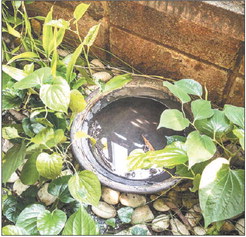WNV-positive mosquito samples detected in LW


OC MOSQUITO & VECTOR CONTROL DISTRICT
The Orange County Mosquito and Vector Control District has detected mosquito samples infected with West Nile Virus in Leisure World. Two positive samples were taken from the flood channel bisecting the community on Sept. 10.
Samples also tested positive for WNV in 10 other OC cities, with the most in Fullerton, 14 positive samples.
The OCMVCD conducts county-wide mosquito control during the WNV season, which typically begins in early summer and tapers off in the fall, with the highest risk for disease occurring in mid-July through September.
In Leisure World, inspectors check the flood control channel along Golden Rain Road every 10 days or so for elevated mosquito breeding. When mosquito larvae are found, they are treated with larvicide, which prevents breeding for 120 days.
As OCMVCD continues to identify and treat for mosquito breeding sources, it is essential that residents do their part in eliminating standing water on their properties. Even a capful of water can produce hundreds of mosquitoes.
“Residents need to take immediate action to dump and drain standing water in containers on their property. We must reduce mosquito breeding around homes to reduce the presence of adult mosquitoes and
Inspectors like the one pictured drive around treating hundreds of miles of creeks and flood channels, like the one on Golden Rain Road. OCMVCD inspectors use EPA regulated products in equipment that pushes the larvacide out with a blower type nozzle. Residents need to be vigilant about dumping standing water. Even a capful of water can produce hundreds of mosquitoes. and prevent the transmission of West Nile virus,” stated Heather Hyland, OCMVCD Public Information Officer.
Residents must take charge of their yard to prevent mosquitoes from breeding on their property:
• Tip out any standing water at least once a week
• Toss out any unused containers
• Clean and scrub bird baths and pet water bowls weekly
• Do not transport or share plant clippings rooted in water
• Drill a hole or puncture containers to eliminate standing water To prevent mosquito bites, take action, and follow these tips:
• Apply mosquito repellents to exposed skin before going outdoors; reapply as recommended
• Wear repellent containing DEET®, Picaridin, IR3535, or oil of lemon eucalyptus
• Close all unscreened doors and windows to prevent mosquitoes from entering your home or space; repair broken or damaged screens
• Wear long-sleeved shirts and long pants, and opt for lightercolored clothing Residents are encouraged to sign up for District email notifications. For more information, visit www.ocvector.org.
Most often, WNV is spread by the bite of an infected mosquito. Mosquitoes are WNV carriers (“vectors”) that become infected when they feed on infected birds. Infected mosquitoes can then spread WNV to humans and other animals when they bite.
WNV was first detected in the eastern United States in 1999. WNV cases are now reported in all of the continental United States, according to the Centers for Disease Control.
There are no vaccines to prevent it or medications to treat it. Fortunately, most people infected with WNV do not have symptoms. About 1 in 5 people who are infected develop a fever and other symptoms. About 1 in 150 infected people develop a serious, sometimes fatal, illness.
Due to COVID-19, the program to report dead birds has been suspended. Reports can be submitted to westnile.ca.gov for risk mapping.





